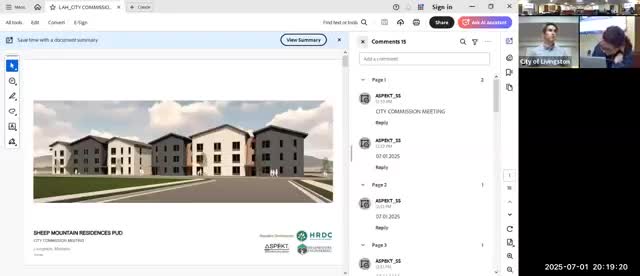Park County Housing Coalition unveils affordable rental project in Livingston
July 06, 2025 | Livingston City, Park County, Montana
This article was created by AI summarizing key points discussed. AI makes mistakes, so for full details and context, please refer to the video of the full meeting. Please report any errors so we can fix them. Report an error »

The City Commission meeting held on July 6, 2025, in Livingston, Montana, focused on a significant development project aimed at addressing the pressing need for affordable housing in the area. The proposed project, known as Sheep Mountain Residences, is a collaboration between Boundary Development and the Park County Housing Coalition, with funding sourced through the Low Income Housing Tax Credit (LIHTC) program.
The project will consist of two three-story buildings, each housing 24 units, designed to provide affordable rental homes for individuals and families earning 60% or less of Park County's area median income. This initiative is particularly crucial as the region faces a shortage of affordable housing options, with current rental prices exceeding what many residents can afford. The average rent in Park County is approximately $1,600 per month, which is nearly $400 more than what half of the renter households can manage.
Catherine Daly, the Grama Manager of the Park County Housing Coalition, emphasized the importance of the LIHTC program, which has been a vital resource for subsidizing affordable housing since its inception. The program mandates that properties remain affordable for at least 30 years, with Montana's regulations extending this requirement to 50 years. This ensures long-term housing stability for low-income residents.
The need for affordable housing is underscored by recent studies indicating that Livingston requires 85 new homes annually to meet demand, with a significant portion of this need being for multifamily housing. The local economy, particularly in sectors such as retail and healthcare, relies heavily on workers who earn below the area median income, further highlighting the urgency of this housing project.
Architecturally, the Sheep Mountain Residences aim to blend functionality with aesthetic appeal. The design incorporates traditional roof lines and durable materials, creating a dignified living environment that does not compromise on quality. The project also includes communal spaces and amenities, fostering a sense of community among residents.
As the city moves forward with this initiative, it represents a proactive step towards alleviating the housing crisis in Livingston, ensuring that essential workers have access to affordable homes. The commission's discussions reflect a commitment to addressing the community's needs and enhancing the quality of life for its residents.
The project will consist of two three-story buildings, each housing 24 units, designed to provide affordable rental homes for individuals and families earning 60% or less of Park County's area median income. This initiative is particularly crucial as the region faces a shortage of affordable housing options, with current rental prices exceeding what many residents can afford. The average rent in Park County is approximately $1,600 per month, which is nearly $400 more than what half of the renter households can manage.
Catherine Daly, the Grama Manager of the Park County Housing Coalition, emphasized the importance of the LIHTC program, which has been a vital resource for subsidizing affordable housing since its inception. The program mandates that properties remain affordable for at least 30 years, with Montana's regulations extending this requirement to 50 years. This ensures long-term housing stability for low-income residents.
The need for affordable housing is underscored by recent studies indicating that Livingston requires 85 new homes annually to meet demand, with a significant portion of this need being for multifamily housing. The local economy, particularly in sectors such as retail and healthcare, relies heavily on workers who earn below the area median income, further highlighting the urgency of this housing project.
Architecturally, the Sheep Mountain Residences aim to blend functionality with aesthetic appeal. The design incorporates traditional roof lines and durable materials, creating a dignified living environment that does not compromise on quality. The project also includes communal spaces and amenities, fostering a sense of community among residents.
As the city moves forward with this initiative, it represents a proactive step towards alleviating the housing crisis in Livingston, ensuring that essential workers have access to affordable homes. The commission's discussions reflect a commitment to addressing the community's needs and enhancing the quality of life for its residents.
View full meeting
This article is based on a recent meeting—watch the full video and explore the complete transcript for deeper insights into the discussion.
View full meeting
